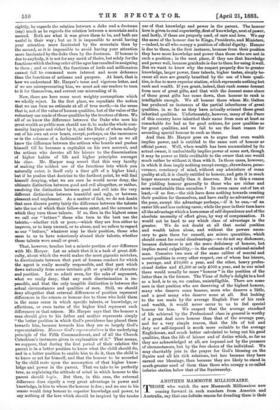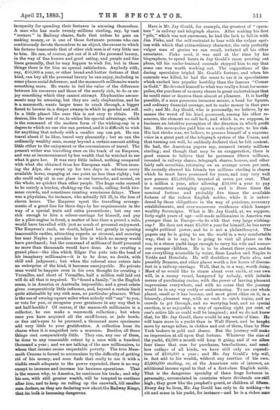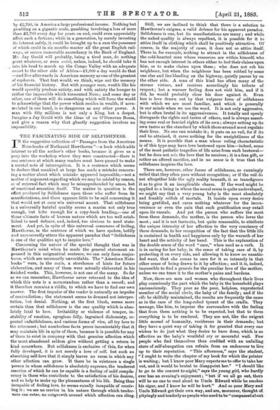ANOTHER MAMMOTH MILLIONAIRE.
THOSE who watch the new Mammoth Millionaires now coming forward in such.numbers from America and Australia, say that one definite reason for dreading them is their
incapacity for spending their fortunes in amusing themselves. A man who has made twenty millions sterling, say, by vast " corners " in Railway shares, finds that unless he goes on making money, or is one of those fortunate persons who can continuously devote themselves to an object, the excess to which his fortune transcends that of other rich men is of very little use to him. He can, of course, get out of it all the personal luxury, in the way of fine houses and good eating, and purple and fine linen generally, that he may happen to wish for, but in those things there is for him no special satisfaction. Anybody with, say, £50,000 a year, or other bread-and-butter fortune of that kind, can buy all the personal luxury he can enjoy, including in some places social deference; and the mammoth millionaire wants something more. He wants to feel the value of the difference between his resources and those of the merely rich, to do or en. joy something which they cannot attempt. Elephantine amusements may be amusing, but they are only elephantine, and he in a mammoth, wants larger trees to crash through, a bigger forest to browse in, a deeper swamp in which to gambol and roll. In a little planet like ours this is not easy to obtain. He desires, like the rest of us, to utilise his special advantage, which is the command of the modern form of the wishing-cap in a degree to which no one else can pretend, and it is difficult to wish for anything that nobody with a smaller cap can get. He can travel about if he likes, travel very pleasantly ; but so can the ordinarily wealthy man, money beyond a certain amount adding little either to the enjoyment or the conveniences of travel. The present writer was travelling once on the track of an Empress, and was so inconvenienced by her wealth that he watched to see what it gave her. It was very little indeed, nothing compared with what she obtained from her Earopean rank. When crossing the Alps, she swept up for two days in advance every available horse, engaging at one point no less than eighty ; but she could only sit in one place in one barouche, and moved, on the whole, no quicker than other people. The huge suite seemed to be merely a burden, choking-up the roads, calling forth tiresome crowds, and sometimes creating wearisome delays. There was a physician, for instance, who actually fell ill, to the loss of eleven hours. The Empress upset the travelling arrangements of a great line for three days by her requirements in the way of a special train and extra precautions ; but any one rich enough to hire a saloon-carriage for himself, and pay for a pilot-engine in front, a matter of less than a pound a mile, would have travelled with just as much of personal enjoyment.
The Empress's rank, no doubt, helped her greatly in opening inaccessible castles, attracting experts as ciceroni, and securing
her near Naples a paradise to live in which no money would have purchased ; but the command of millions of itself procured no more than thousands would have done. As to creating a grand place—the idea which Edgar Poe puts into the head of his imaginary millionaire—it is to be done, no doubt, with skill and judgment; but when the colossal once enters into an enterprise of the kind, it becomes unenjoyable. No private "man would be happier even in his own thought for creating 2. Versailles, and short of Versailles, half a million well laid out will do all that'is required. To "found a family," in the English sense, is in America or Australia impossible; and a great estate gives comparatively little influence, and, beyond a certain limit quite attainable by any rich man, no particular pleasure. What: is the use of owning square miles when nobody will "cap" to you, or vote for you, or recognise your greatness in any way that is not half-hostile ? Of course, if the mammoth millionaire is a collector, he can make a mammoth collection ; but when once you have acquired all the snuff-boxes, or jade bowls.. or fine cat's-eyes to be procured, a thousand more specimens add very little to your gratification. A collection loses its charm when it is magnified into a museum. Besides, all these things cost comparatively little. They can, any one of them, be done to any reasonable extent by a man with a hundred thousand a year ; and we are talking of the new millionaires, to whom that income seems respectable poverty. The true Mammoth Crcesus is forced to accumulate by the difficulty of getting rid of his money, and soon finds that really to use it with a visible result adequate, to the power expended, there is no way except to increase andlincrease his business operations. That is the reason why, in America, he continues his trade; and why his son, with still greater wealth, will be tempted to continue after him, and,to keep on rolling up the snowball, till smaller men deeiare, as.they are declaring now about the Railway Kings, that its bulk is becoming dangerous. Here is Mr. Jay Gould, for example, the greatest of " operators " in railway and telegraph shares. After making his first "pile," which was not enormous, he had the luck to fall-in with Jim Fiske, and the self-restraint to bear with the vulgar egotism with which that extraordinary character, the only perfectly vulgar man of genius we can recall, irritated all his other associates. Fiske used, it was said at the time by his biographers, to spend hours in Jay Gould's room pouring out plans, till his cooler-brained comrade stopped him to say that some one was worth working out. The suggestions of the daring speculator tripled Mr. Gould's fortune, and when his comrade was killed, he had the sense to use it in speculations which excited less popular hostility than the famous "Corner in Gold." He devoted himself to what was really a hunt for monopolies, the purchase of so many shares in great undertakings that he could raise or depress them almost at pleasure. It is hardly possible, if a man possesses immense means, a head for figures, and ordinary financial courage, not to make money in that pursuit; and Mr. Jay Gould, who is personally, we believe, by no means the worst of his kind, possessed, among his other resources, the element we call luck, and which is, we suppose, in business an intuitive perception of the direction in which profit lies. His monopolies paid him on a scale adequate to his risk. His last stroke was, we believe, to possess himself of a supreme voice in a great part of the telegraph system of the Union, and that turning out well, he suddenly declared that he felt content. He had, the American papers say, amassed twenty millions sterling; and though that may be an exaggeration, there is good reason to believe that he possesses fifteen millions, invested in railway shares, telegraph shares, houses, and other fairly safe securities, returning on an average seven per cent. He recently showed his friends ten millions sterling in shares which he must have possessed for years, and may very well now possess £15,000,000, invested at seven per cent. That is a million a year, after allowing £50,000 a year to pay for competent managing agency, and is three times the nominal fortune and probably five times the available fortune of the richest English nobles, while it is unburdened by those obligations in the way of pensions, necessary establishments, and over-numerous residences which hamper wealthy Sovereigns. What is Mr. Jay Gould, at, we suppose, forty-eight years of age—self-made millionaires in America run younger than in Europe—to do with that very large wishingcap P He does not want £5,000 a year for himself, he has never sought political power, and he is not a philanthropist. The papers say he is going to see the world in a very comfortable way, that is to say, he is going to visit all places on the sea, in a steam yacht large enough to carry his wife and numerous younger children. He is to be absent three years, anthto see everything accessible by water, from London and Naples to Yeddo and Honolulu. He will doubtless see Paris also, and possibly Benares, and other places worth a few hours of discomfort in a railway-carriage. Well, that is, in a way, worth doing. Most of us would like to steam about over earth, at our own will, in a roomy vessel, hampered by nobody, with infinite means of purchasing curios, with the power of leaving pleasant impressions everywhere, and with no sense that the journey would be in any way costly or embarrassing. To see our whole planet, small as it has become, and most great cities on it, in a leisurely, pleasant way, with no rush to catch trains, and no crowds to get through, and no worrying heat, and no special exertion, is as enjoyable a way of spending eight per cent of one's active life as could well be imagined ; and we do not know that, for Mr. Jay Gould, there would be any waste of time. He will learn more in a yacht than in Wall Street, and be taught more by savage tribes, in clothes and out of them, than by New York brokers in gold and shares. But the journey will make no impression at all upon that fortune. Whatever the sizes ef the yacht, £2,000 a month will keep it going, and if we albow four times that sum for purchases, benefactions, and :needless outlays of all kinds, we have still only an expenditure of £100,000 a year ; and Mr. Jay Gould's trip will, in fact add to his wealth, without any exertion of his own, £3,000,000 sterling, or, at the American rate of interest, an additional income equal to that of a first-class English noble. That is the dangerous specialty of these huge fortunesin personalty, accumulated in countries where dividends are-still ,high ; they grow like the prophet's gourd, or children of fifteen. Every day he lives, Mr. Jay Gould has only to do nothing—ho sit and muse in his yacht, for instance—and he is a richer-man by £2,700, in Am erica a large professional income. Nothing but gambling on a gigantic scale, gambling involving a loss of more than £2,700 every day for years on end, could even appreciably affect such a fortune; while in a generation, by merely investing its interest safely, it could be brought up to a sum the possessor of which could in six months master all the great English railways, or secure immovable ascendancy in the Bank of England. Mr. Jay Gould will probably, being a tired man, do nothing great whatever, or even outré, unless, indeed, he should take it into his head to march up the Congo Valley with an adequate escort to the other side of Africa-21,000 a day would do that —and live afterwards in American memory as one of the greatest of explorers. That feat would, we think, wipe out the memory of his financial history. But with younger men, wealth like his would speedily produce satiety, and with satiety the hunger to realise the impossible which tormented Nero ; and some day or other, one of them will do something which will force the world to acknowledge that the power which resides in wealth, if accumulated in one hand, is as dangerous as any other power. A man with fifty millions is not only a King, but a despot. Imagine a Jay Gould with the ideas of an O'Donovan Rosso., and give a reason why that ghastly suggestion involves an impossibility.




































 Previous page
Previous page